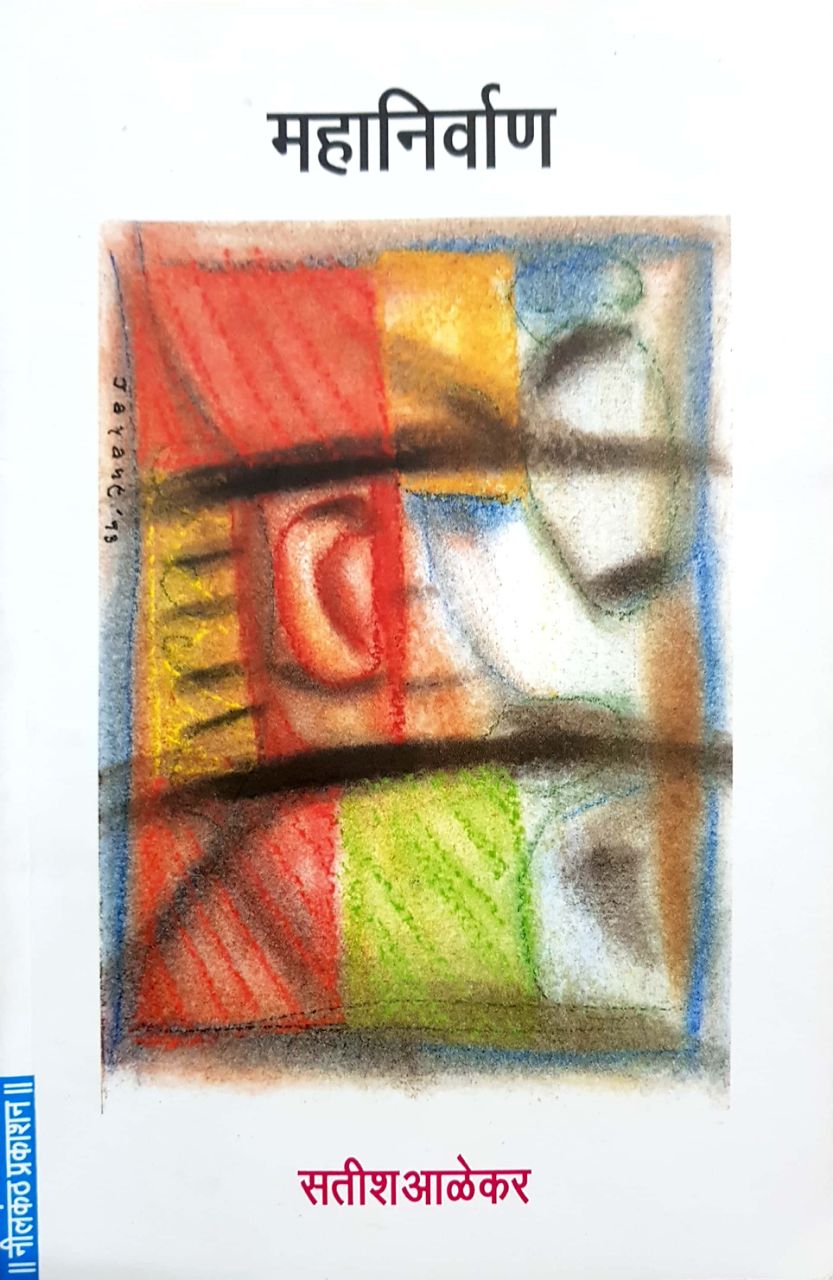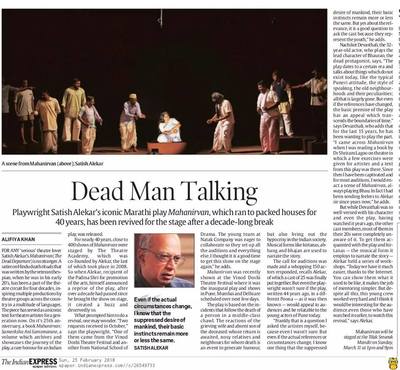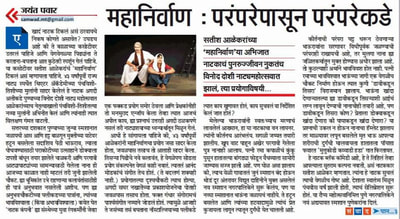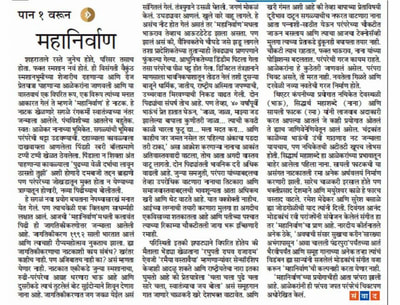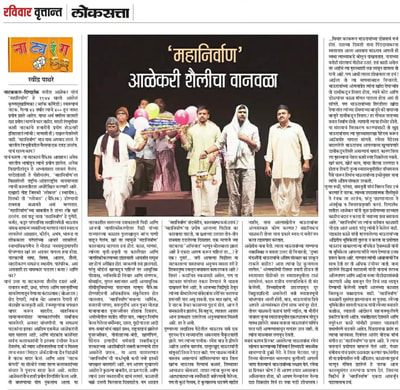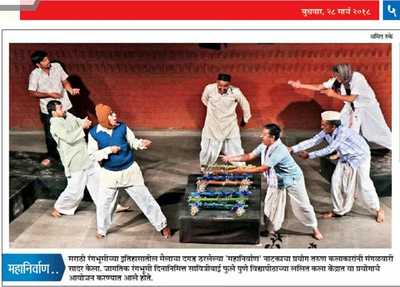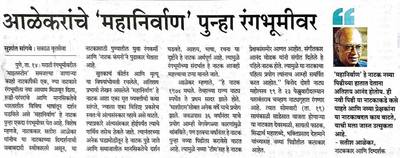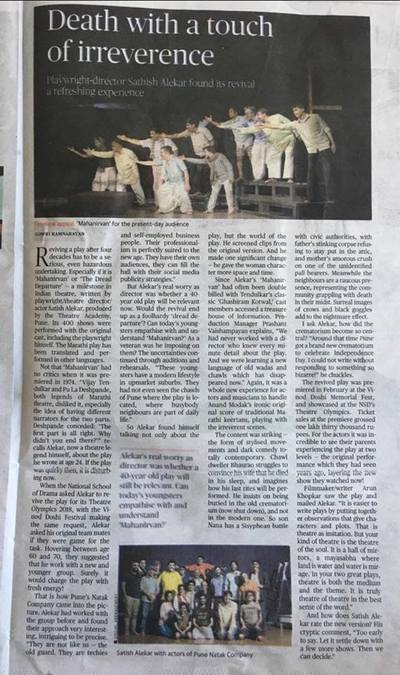Mahanirvan - The Dread Departure
Playwright & Director : Satish Alekar
About the Playwright :
Satish Alekar’s best plays are like jigsaw puzzles in which not all the pieces are designed to fit in exactly. Some do, some don’t seem to, but no piece is random. The action often proceeds at a tangent to what the words are saying; the narrative gets refracted through subplots which seem unrelated. But the total effect is unified and disturbing. Alekar’s sensibility is shaped by his Brahminism with all its certainties as well as lacerating self-doubts, by the vibrant heritage of his Pune ransacked by politicians, and by the rich lore of the musical theatre in Marathi which did not outlast its stars. Alekar exploits the multipletraditions he has inherited, wallowed in and resented to produce some of the most powerful plays of modern indian stage.
By Girish Karnad
Playwright
Padmabhushan and Jnanpith Laureate.
By Girish Karnad
Playwright
Padmabhushan and Jnanpith Laureate.
About the Play :
Mahanirvan has been considered as one of the most distinguished plays, a reputed milestone in the history of Indian Theatre. Right from the 1st show of the play, in 1974, till today with about 400 shows; it is considered to be one of the finest pieces of artistic craftsmanship. The theme /content of this play is so apt & relevant to socio-cultural aspects that it has been translated & performed in more than 10 languages across the country.
Mahanirvan is also one of the prescribed texts in the university curriculum for literature courses.
Besides its extraordinarily different writing style, it is highly revered for its treatment on stage- The entire play is performed in a lyrical/ musical form using Maharashtrian folk lore like Kirtan, Gondhal, Bhajan, Abhang etc.
With its unique feature of canny humour & black comedy, the play aptly highlights the intricacies of human relations & emotional ethos, while passing subtle messages on socio-cultural systems, typical human tendencies, customs & traditions etc.
Mahanirvan is also one of the prescribed texts in the university curriculum for literature courses.
Besides its extraordinarily different writing style, it is highly revered for its treatment on stage- The entire play is performed in a lyrical/ musical form using Maharashtrian folk lore like Kirtan, Gondhal, Bhajan, Abhang etc.
With its unique feature of canny humour & black comedy, the play aptly highlights the intricacies of human relations & emotional ethos, while passing subtle messages on socio-cultural systems, typical human tendencies, customs & traditions etc.
Play Synopsis
Act I:
Bhaurao, the protagonist in the play is a common man living in a chawl, who is in his fifties.
At the beginning of the play he tries to convey & convince his wife, Rama, that he is no more as he died in his sleep last night. But she ignores him; assuming that he is just joking; playing a prank. Bhaurao then proves his demise by giving her some strong evidences, he makes her believe in whatever he is saying by bringing to her notice the reactions of the chawlkari –neighbors.
Rama finally understands & accepts that he is dead. She cries & starts mourning over her husband’s death.
Bhaurao then imagines all the proceedings of his funeral & the last rites; he depicts how his chawlkari- neighbors would react to the situation.
Unfortunately on the day of his demise, Bhaurao’s only son Nana is not in town; he has gone to play a sport tournament in some other town; all the neighbors are waiting for Nana’s arrival; last rites are on hold due to this delay. Bhaurao vividly illustrates everything that would happen in this wait time.
Finally Nana arrives, the funeral starts; all chawlkari- neighbors accompany Nana to the crematorium but they all get stuck as they get to know that Municipal Corporation has shut down that crematorium and a new one is set up far away; the rites get further delayed.
Bhaurao fantasizes that he is through with all the rituals and has reached the heaven, Nana makes him realize that it’s not over yet – the last rights are yet to be done- Bhaurao insists that he would want his last rites to be performed in the old crematorium only, and Nana explains the hindrances in doing so.
Act II
Act begins with Nana now taking over as the narrator. He orders his mother to cook rice balls as that was of 10th auspicious day after his father’s death and he wants to take rice balls to the new crematorium to offer rice balls (Pind) to crows. He meets two characters fighting for the place to keep rice balls. They are also at the new crematorium to offer rice balls to the dead soul. Nana helps and tries to sort out their differences by becoming crow himself. To his surprise his father, Bhaurao also reaches to the site of new crematorium. Nana offers rice balls to his hungry father who has not yet cremated. Father complains that he feels suffocated in the attic of his home where Nana has hidden him. He also mentions that that as he is a stinking corpse. A part of his finger is cut off and it needs stitching. Nana hurriedly stiches his finger and scolds him not to come out on the street as he is not cremated yet.
Nana laments over his own plight & misery as he is unable to perform the last rites as per his father’s wish.
Bhaurao requests Nana to let him meet Rama ; he says he wants to talk to her at least once, he has been missing her- Nana allows him to meet his mother - but Bhaurao gets a shock of his life to know that his beloved wife, Rama, has found someone else after him. Rama tells his that she liked the man who was wearing a black suit at the time of funeral procession and that was third from the left when they lift the bier of Bhaurao. Bhaurao is shocked hearing this and he tells Nana about this; Nana is stunned to see this sudden twist in the story; he probes his mother to find out facts and more details of this new story- he asks his mother to reveal all the details- Rama confesses her feelings towards the New man but tells Nana that she can’t describe the man exactly ; but she remembers his attire; a suit & black goggle- she says she saw him last when he had come for Bhaurao’s funeral-
Nana & Bhaurao get on to a mission of finding out the man with a suit & black goggle, they decide to find out everything about him- Who is he, was he there in Rama’s life before Bhaurao’s death, or did they meet after his death; where & how did they meet etc.
To explore more details, Nana tells his father to dress up exactly like the man that
his mother has been describing.
Nana tells his mother that he is willing to help her for her 2nd marriage – with the man of her desire- and he has invited the same man to their house- Bhaurao (dressed up like the man) comes and interacts with Rama- she blushes – she is thrilled; she is very excited for the beginning pf her new life.
Nana is perplexed; he cannot understand the complexities of this intricate puzzle; he takes his father to the old crematorium and performs the last rites.
Bhaurao peacefully cremated in the old crematorium.
Bhaurao, the protagonist in the play is a common man living in a chawl, who is in his fifties.
At the beginning of the play he tries to convey & convince his wife, Rama, that he is no more as he died in his sleep last night. But she ignores him; assuming that he is just joking; playing a prank. Bhaurao then proves his demise by giving her some strong evidences, he makes her believe in whatever he is saying by bringing to her notice the reactions of the chawlkari –neighbors.
Rama finally understands & accepts that he is dead. She cries & starts mourning over her husband’s death.
Bhaurao then imagines all the proceedings of his funeral & the last rites; he depicts how his chawlkari- neighbors would react to the situation.
Unfortunately on the day of his demise, Bhaurao’s only son Nana is not in town; he has gone to play a sport tournament in some other town; all the neighbors are waiting for Nana’s arrival; last rites are on hold due to this delay. Bhaurao vividly illustrates everything that would happen in this wait time.
Finally Nana arrives, the funeral starts; all chawlkari- neighbors accompany Nana to the crematorium but they all get stuck as they get to know that Municipal Corporation has shut down that crematorium and a new one is set up far away; the rites get further delayed.
Bhaurao fantasizes that he is through with all the rituals and has reached the heaven, Nana makes him realize that it’s not over yet – the last rights are yet to be done- Bhaurao insists that he would want his last rites to be performed in the old crematorium only, and Nana explains the hindrances in doing so.
Act II
Act begins with Nana now taking over as the narrator. He orders his mother to cook rice balls as that was of 10th auspicious day after his father’s death and he wants to take rice balls to the new crematorium to offer rice balls (Pind) to crows. He meets two characters fighting for the place to keep rice balls. They are also at the new crematorium to offer rice balls to the dead soul. Nana helps and tries to sort out their differences by becoming crow himself. To his surprise his father, Bhaurao also reaches to the site of new crematorium. Nana offers rice balls to his hungry father who has not yet cremated. Father complains that he feels suffocated in the attic of his home where Nana has hidden him. He also mentions that that as he is a stinking corpse. A part of his finger is cut off and it needs stitching. Nana hurriedly stiches his finger and scolds him not to come out on the street as he is not cremated yet.
Nana laments over his own plight & misery as he is unable to perform the last rites as per his father’s wish.
Bhaurao requests Nana to let him meet Rama ; he says he wants to talk to her at least once, he has been missing her- Nana allows him to meet his mother - but Bhaurao gets a shock of his life to know that his beloved wife, Rama, has found someone else after him. Rama tells his that she liked the man who was wearing a black suit at the time of funeral procession and that was third from the left when they lift the bier of Bhaurao. Bhaurao is shocked hearing this and he tells Nana about this; Nana is stunned to see this sudden twist in the story; he probes his mother to find out facts and more details of this new story- he asks his mother to reveal all the details- Rama confesses her feelings towards the New man but tells Nana that she can’t describe the man exactly ; but she remembers his attire; a suit & black goggle- she says she saw him last when he had come for Bhaurao’s funeral-
Nana & Bhaurao get on to a mission of finding out the man with a suit & black goggle, they decide to find out everything about him- Who is he, was he there in Rama’s life before Bhaurao’s death, or did they meet after his death; where & how did they meet etc.
To explore more details, Nana tells his father to dress up exactly like the man that
his mother has been describing.
Nana tells his mother that he is willing to help her for her 2nd marriage – with the man of her desire- and he has invited the same man to their house- Bhaurao (dressed up like the man) comes and interacts with Rama- she blushes – she is thrilled; she is very excited for the beginning pf her new life.
Nana is perplexed; he cannot understand the complexities of this intricate puzzle; he takes his father to the old crematorium and performs the last rites.
Bhaurao peacefully cremated in the old crematorium.
Director's Note:
The Play originally written and produced for the group which we founded in 1973 Theatre Academy, Pune. Occasion was the annual affaire of Maharashtra State Drama Completion. First show was performed on Nov 22, 1974. All actors in the play were in the early or late twenties including me. I did not have any clue that the play will remain alive in the performance with almost in the original cast till 2010 that is for about 36 years. Play completed more than 400 shows before it was closed down in 2010. Play hasn’t performed since then. During last 43 years the play was translated in many other Indian languages all over India. Hindi productions of Abhiyan, Delhi, Bharat Bhavan, Bhopal and Nat Bundele, similarly Guajarati production of the play with title Ta-thaiyya were very successful.
When I was asked to revive this play for Theatre Olympics of 2018. I was in two minds. I am not sure that the play which was written 43 years back can make any sense to the young actors of today who are in their twenties. Since usually I direct my own plays, I was asking this question to myself that ‘Am I imposing my play on this young generation of actor who were born in 90’s or are they accepting the play just because of my seniority?’ Well it is for them to answer and for the audience to take a final call. Much has been said about the play, its content, and form over last many years and if elaborate any further it will be nothing but the repetition.
For me it was like a dream to work with the young, energetic, smart, well informed, and obedient actors of Natak Company, Pune, the group which was established a decade ago. I would like to thank our group Theatre Academy, Pune and the original cast members especially Chandrakant Kale, Ramesh Medhekar who gave right tips to these young actors and also senior musician Rajiv Paranjpe who trained and supervised the original live musical score. I also would like to extend my sincere thanks to Smt. Prabha Marathe and her organization Kalachhaya Cultural Centre for providing rehearsal space for more than 40 days.
Lastly I would like dedicate this revival of play ‘Mahanirvan’ to the memory of my dear friend Anand Modak (1951-2014) who composed the original Music for the play. He in fact, started his carrier in Music with this play. Same music is used for the revival.
Satish Alekar, Pune
(Playwright and Director, Pune)
When I was asked to revive this play for Theatre Olympics of 2018. I was in two minds. I am not sure that the play which was written 43 years back can make any sense to the young actors of today who are in their twenties. Since usually I direct my own plays, I was asking this question to myself that ‘Am I imposing my play on this young generation of actor who were born in 90’s or are they accepting the play just because of my seniority?’ Well it is for them to answer and for the audience to take a final call. Much has been said about the play, its content, and form over last many years and if elaborate any further it will be nothing but the repetition.
For me it was like a dream to work with the young, energetic, smart, well informed, and obedient actors of Natak Company, Pune, the group which was established a decade ago. I would like to thank our group Theatre Academy, Pune and the original cast members especially Chandrakant Kale, Ramesh Medhekar who gave right tips to these young actors and also senior musician Rajiv Paranjpe who trained and supervised the original live musical score. I also would like to extend my sincere thanks to Smt. Prabha Marathe and her organization Kalachhaya Cultural Centre for providing rehearsal space for more than 40 days.
Lastly I would like dedicate this revival of play ‘Mahanirvan’ to the memory of my dear friend Anand Modak (1951-2014) who composed the original Music for the play. He in fact, started his carrier in Music with this play. Same music is used for the revival.
Satish Alekar, Pune
(Playwright and Director, Pune)
Cast List:
|
Credit List:Orignal Music composed by : Late Anand Modak
Music Co-ordination : Rajiv Paranjpe Background Music : Gandhaar Musicians : Swapnil Kulkarni, Ketan Pawar, Swanand Tarde Choreography : Sayalee Phatak Light Design : Anupam Barve & Vikrant Thakkar Costumes : Devika Kale Make-up : Ashish Deshpande Stage Manager : Rohit Petkar Set : Ravi Choudhary Production Stills : Shriram Patki Production Manager : Prashant Vaishampayan |
